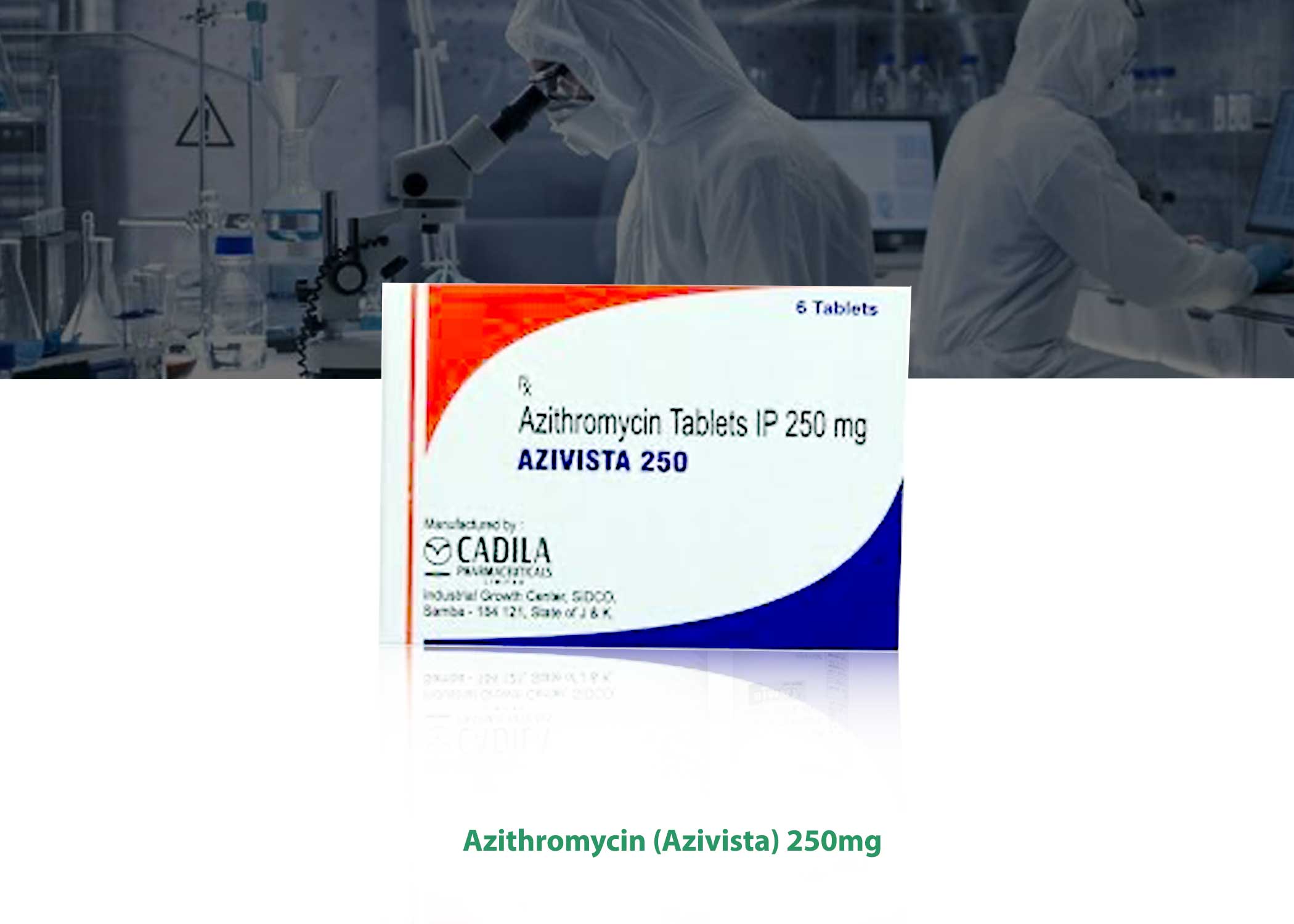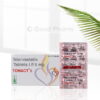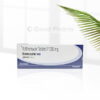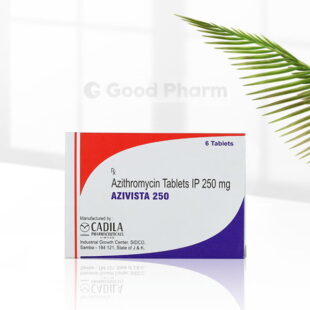- Your cart is empty
- Continue Shopping
Azithromycin (Azivista) 250mg tablet is a generic brand name of its active ingredient, Azithromycin. This medicine is an antibiotic used to treat certain bacterial infections such as bronchitis, pneumonia, sexually transmitted diseases (STD’s), and infections of the ears, lungs, sinuses, skin, throat and reproductive organs. It is also used to treat or prevent disseminated mycobacterium avium complex (MAC) infection (a type of lung infection that often affects people with Human Immunodeficiency virus [HIV]).
This antibiotic is not used for the treatment of colds, flu, or other viral infections. Using antibiotics when they are not needed increases your risk of getting an infection and can lead to its decreased effectiveness.


What does Azithromycin (Azivista) 250mg contain?
Azivista 250mg tablet has 250mg of azithromycin, an antibiotic that stops bacteria from producing essential proteins they need to carry out vital functions. It also prevents the bacteria from spreading and stops worsening infection.
How does Azithromycin (Azivista) 250mg work?
Azivista tablet and its active ingredient, azithromycin, is classified as a second generation macrolide, broad spectrum antibiotic. It has immunomodulatory, anti-inflammatory, and antibacterial effects.
Azithromycin acts by blocking of the bacterial protein synthesis, inhibition of proinflammatory cytokine production and of neutrophil infestation, and macrophage polarization alteration, which gives it the ability to act against a wide range of microorganisms. Thus it prevents further bacterial growth and multiplication.
Who cannot take Azithromycin (Azivista) 250mg?
- Azivista is contraindicated in patients with a history of severe hypersensitivity (e.g., Anaphylaxis or SJS) to azithromycin or another macrolide antimicrobial.
- Clinicians should be cautious regarding the concomitant use of azithromycin and other medications that prolong the QT interval (e.g., antipsychotics)
- Azivista is contraindicated to patients with myasthenia gravis, a condition that causes muscle weakness. It may exacerbate the condition and may develop worsening symptoms or breathing problems.
- Doctors should not prescribe this drug to treat pneumonia if a patient has: cystic fibrosis, hospital- acquired infection, bacteremia, old and debilitated, has a significant underlying health problem such as immune system problems.
A patient should speak to a doctor about any existing heart, kidney, and liver conditions before taking azithromycin, including an irregular heartbeat and especially QT prolongation.
How should you take Azithromycin (Azivista) 250mg?
Take Azivista 250mg tablet exactly as prescribed by your doctor. The usual dose is 250 mg or 500 mg given once daily for 3 to 5 days, and in severe infections, a higher dose is used. You may view Additional Information tab for recommended doses. Take this medication orally with food (to reduce gastrointestinal upset) or without food but preferably one hour before or 2 hours after a meal. Swallow it as a whole. Do not chew, crush or break it. It should be taken regularly at evenly spaced time intervals.
Follow all directions on your prescription label. Do not take this medicine in larger or smaller amounts or for longer than recommended. Do not skip any doses and finish the full course of treatment even if you feel better. Stopping the medicine too early may lead to the return or worsening of the infection. The dose and length of treatment may not be the same for every type of infection.
What if you miss a dose?
Skipping doses or not completing the course of treatment may increase the risk of re-infection that would be difficult to treat in the future. If you miss a dose of this medicine, take it as soon as possible. However, if it is almost time for your next dose, skip the missed dose and go back to your regular dosing schedule.
Do not double the doses.
What if you take too much?
Taking an extra dose of azithromycin is unlikely to harm you. However, you may experience temporary side effects, such as nausea and diarrhea.
Talk to your health care provider if you feel unwell.
What are the side effects of Azithromycin (Azivista) 250mg?
Most side effects do not require any medical attention and disappear as your body adjusts to the medicine. Consult your doctor if they persist or if you’re worried about them.
The most common side effects are:
- Stomach upset
- Diarrhea
- Nausea
- Vomiting
Get emergency medical help if you have signs of an allergic reaction (hives, difficulty of breathing, swelling in your face of throat) to azithromycin, or a severe skin reaction (fever, sore throat, burning in your eyes, skin pain, red or purple skin rash that spreads and causes blistering and peeling).
Less common, occurring in up to 1% of cases include:
- Heart palpitations or chest pain
- Dizziness, headache,
- Fatigue
- Fatigue
- Vaginitis
- Dry skin and sun sensitivity
Serious side effects are rare but can include:
- Hearing changes
- Eye problems
- Difficulty speaking/swallowing
- Muscle weakness
- Heart rhythm changes or problems, which are more likely in people who take heart rhythm medications, older people, and those with low blood potassium
- Liver damage, especially in people with a history of liver problems
Get medical help right away if you have any of these serious side effects.
What other precautions should be taken?
Children
Dose is based on body weight and must be determined by a doctor.
Elderly
No studies have demonstrated problems that would limit the drug’s usefulness in this population. However, the elderly are more likely to have heart rhythm problems which requires caution in using this drug.
Pregnant and breastfeeding
Azivista, and its active ingredient, azithromycin, is categorized as FDA pregnancy class B. The data for risk of congenital malformations associated with use of azithromycin during pregnancy ranges from no risk to a small increased risk. Therefore, azithromycin can be safely use during pregnancy and while breastfeeding. However, there is no conclusive evidence to support that azithromycin use by pregnant women causes adverse outcomes in their offspring. Therefore, this agent should only be used during pregnancy when clinically indicated, if the benefits of treatment are expected to outweigh the potential risks.
Drug-Disease Interactions
- Tell your doctor if you are allergic to azithromycin, and any other medications, or any of the ingredients in azithromycin tablets.
- Tell your doctor if you ever had jaundice (yellowing of the skin or eyes) or other liver problems while taking azithromycin. Your doctor will probably tell you not to take azithromycin.
- Inform your doctor if you or anyone in your family has or has ever had a prolonged QT interval (a rare heart problem that may cause irregular heartbeat, fainting or sudden death) or a fast, slow, or irregular heartbeat, and if you have low levels of potassium or magnesium in your blood, if you have a blood infection, heart failure or other heart problems
Drug-Drug Interactions
Azithromycin interacts with a lot of drugs. It may change how your medications work or increase your risk of serious side effects.
Inform your doctor about the other prescription and non-prescription medications, vitamins, nutritional supplements, and herbal products you are taking or plan to take. Your doctor may need to change the doses of your medications or monitor you carefully for side effects.
Many drugs besides azithromycin may affect the heart rhythm (QT prolongation) such as Class IA antiarrhythmics (Quinidine, Procainamide), and class III antiarrhythmics (Dofetilide, Amiodarone, Sotalol).
Azithromycin also increased the serum concentration of digoxin, colchicine, and ciclosporin. It may also potentiate the effects of oral anticoagulants (e.g Warfarin).
If you are taking antacids containing aluminum hydroxide or magnesium hydroxide, you will need to allow some time to pass between when you take a dose of azithromycin tablets. Ask your doctor on how many hours before or after you take azithromycin you may take these medications.
This document does not contain all possible drug interactions. Keep a list of all the products you use (including prescription/nonprescription drugs and herbal products) and share it with your doctor. Do not start, stop, or change the dosage of any medicines without your doctor’s approval.
Alcohol
You can drink alcohol while taking this drug. However, if it makes you feel dizzy, do not drink alcohol because it can worsen your dizziness.
Driving
This drug does not impair your ability to drive. However, if you feel dizzy after taking this drug, do not drive.
Diet and lifestyle
You can eat and drink normally while taking this drug. However, if it makes you feel dizzy, avoid drinking alcohol.
How should you store Azithromycin (Azivista) 250mg?
- Store the medicine at room temperature, away from heat, moisture, and direct light.
- Keep out of the reach of children and pets.
- Do not keep expired medicine or medicine no longer needed.
- Ask your healthcare professional how you should dispose of any medicine you do not use.
Quick Tips
- Do not skip any dose and finish the full course of treatment even if you feel better. Stopping it too early may make the infection come back and make it harder to treat.
- Take this medicine one hour before or two hours after meals.
- Stop taking it and inform your doctor immediately if you develop itchy rash, swelling of the face, lips, or tongue, and difficulties breathing.
What company produces Azithromyin (Azivista) 250mg?
| Cadila Pharmaceuticals | Founder/Chairman: Indravadan Modi Founded: 1951 Headquarters: Bhat Sarkhej-dholka Rd, Sarkhej, Gujarat, Ahmedabad, India Number of employees: 4,201 Subsidiaries: Kadera Yakuhin Ltd., CPL Inc., Cadila Pharmaceuticals Sweden AB, Satellite Overseas (Holdings) Ltd., Apollo International Ltd Website: https://www.cadilapharma.com |
Additional Information
| Dosage | The dose of this medicine will be different for different patients. Follow your doctor's orders or the directions on the label. Recommended doses are as follows. If your dose is different, do not change it unless your doctor tells you to do so. Community-acquired pneumonia: Acute bacterial sinusitis Respiratory tract infections, skin and soft tissue infections: Uncomplicated gonorrhoea Chancroid, uncomplicated genital infections due to Chlamydia trachomatis: |
|---|---|
| Side Effects | Common side effects: Less common side effects: Rare but serious side effects: |
| Contraindications | – Allergic to azithromycin and other macrolide antibiotics |
| Pack Size | 30 Pills, 60 Pills, 90 Pills |
You must be logged in to post a review.










1 review for Azithromycin (Azivista) 250mg – Y